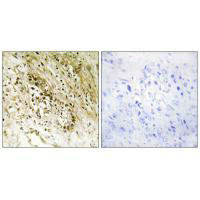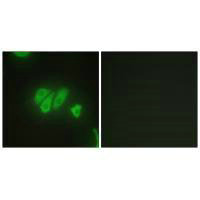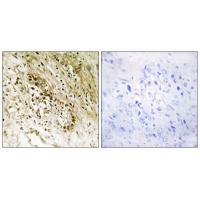
Immunohistochemistry analysis of paraffin-embedded human prostate carcinoma tissue, using PDZD2 antibody.
PDZD2 Antibody
CSB-PA826920
ApplicationsImmunoFluorescence, ELISA, ImmunoHistoChemistry
Product group Antibodies
ReactivityHuman, Mouse
TargetPDZD2
Overview
- SupplierCusabio
- Product NamePDZD2 Antibody
- Delivery Days Customer20
- ApplicationsImmunoFluorescence, ELISA, ImmunoHistoChemistry
- CertificationResearch Use Only
- ClonalityPolyclonal
- ConjugateUnconjugated
- Gene ID23037
- Target namePDZD2
- Target descriptionPDZ domain containing 2
- Target synonymsAIPC, PAPIN, PDZK3, PIN1, PDZ domain-containing protein 2, PDZ domain-containing protein 3, activated in prostate cancer protein, plakophilin-related armadillo repeat protein-interactive PDZ protein
- HostRabbit
- IsotypeIgG
- Protein IDO15018
- Protein NamePDZ domain-containing protein 2
- Scientific DescriptionProteins containing PDZ domains have been shown frequently to bind the C-termini of transmembrane receptors or ion channels. They have also been shown to bind to other PDZ domain proteins and could possibly be involved in intracellular signalling. The protein encoded by this gene contains six PDZ domains and shares sequence similarity with pro-interleukin-16 (pro-IL-16). Like pro-IL-16, the encoded protein localizes to the endoplasmic reticulum and is thought to be cleaved by a caspase to produce a secreted peptide containing two PDZ domains. In addition, this gene is upregulated in primary prostate tumors and may be involved in the early stages of prostate tumorigenesis. Chaib H., Cancer Res. 61:2390-2394(2001). Nagase T., DNA Res. 4:141-150(1997).
- ReactivityHuman, Mouse
- Storage Instruction-20°C or -80°C
- UNSPSC41116161







